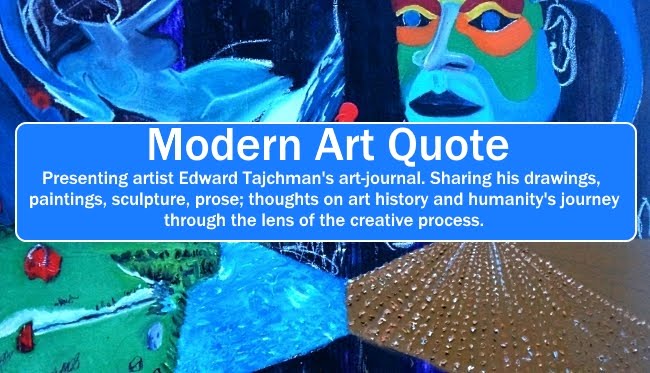Terms that I absolutely hate, that are used to describe artists sometimes are: Insider and Outsider art. That's just ridiculous; theory, academia, snobbish galleries, critics, all of this detracts from true art. These people that need to classify and separate things in such a way are vain and ignorant. What I am saying is that ultimately, no theory, no knowledge, no formal training, no anything is needed prior to viewing a work of art to understand it, or 'get it' (whatever that means), or even to create a work of art. This quote from da Vinci backs me up on that:
"The supreme misfortune is when theory outstrips performance."
-Leonardo da Vinci
In my artistic style for example, yes it is a kind of personal non-objective language that I have developed over time partially based from various artistic influences. But at the same time my work I think is universally accessible. You don't need to know my life story, my theory, my mentors, my family life or anything else to appreciate it. Good art should speak for itself. Of course knowing art-history (obviously I love art-history) can definitely deepen one's understanding of an artist's work, it should by no means be necessary to understand a work of art, even in cases of very conceptual art.









5 comments:
Believe it or not, 40 years ago in a college lit class I had a unique professor who actually accepted that I had a right to interpret Robert Frost's work the way I saw it instead of the way he saw it. Considering the closed academic minds in that era, I was shocked. Needless to say I have to agree with your post. Art is art in the eye of the beholder regardless of "expert" opinion.
thanks for reading ibdragon,...yah so called experts and 'critics' can be good teachers obviously, but are not the end-all be-all of art, like some of them would like to believe.
I've just discovered your blog and am enjoying it a lot - many of these topics are interesting to me as well. I'm a fine artist with an interest in art history and theory (as well as a degree in philosophy, though that was in my long distant past). I hope you'll visit my blog as well and share some thoughts.
This topic of how to observe and appreciate art is complex because it can occur at so many levels. I agree that little or no background knowledge of the artist, his intentions, the context of his work, theory or aesthetics is necessary to have one's own personal experience of a piece. Some art seems to be really hard to relate to without this - particularly more contemporary art. Some of it has become so personal as to have little meaning to most others. I don't think it makes it better or worse, perhaps just harder to access.
Hi Bob, thanks for reading and for your compliment. I've been refining my library of posts lately so If things were a little weird, that's why. I look at it like this: take for example those little blurbs hanging by pieces in museums; that describe the work a little bit. If I have to read the blurb to get any kind of response from the piece, then that is not a deal breaker but is one strike against it.
"The supreme misfortune is when theory outstrips performance." That quote in my opinion is a great quote Ed, the problem nowadays is due to the need to have a large knowledge of the history of art, and there is so much to learn, it cuts everyone else off!!
This leaves artists and art historians appreciating new works etc but I find from my own experience where I do large scale outdoor artwork that talking to passers by on the street from all ages, countries etc they haven't got a clue what is going on and get bogged down by everything they have to learn to understand it, so it backs up Leonardo's quote that the theory has outstripped the performance..
Post a Comment